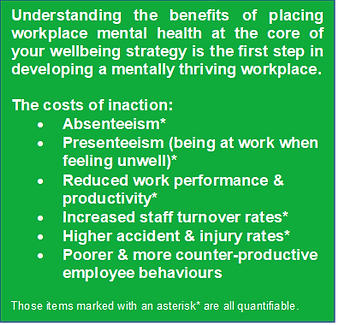Mental Health at Work - The Next Phase
|
| There has been a lot of ‘raising awareness’ of mental health (MH) issues taking place at work over the past few years, especially since COVID-19 severely impacted our lives and workplaces. This has helped to bring them into the general public consciousness and significantly reduce the associated stigma. It is now time to move on from the ‘raising awareness’ phase and start working towards taking practical and measurable steps to address the issues employees are facing. |
 |
.jpg) |
| |
| Barriers still exist on both sides of the employer/employee divide and these barriers are real, even if they are only perceived. These barriers include work culture, budget restrictions, disillusioned employees, lack of open communication, etc., and they can undermine any efforts to develop a healthy work environment. Understanding the benefits of placing employee mental health at the centre of your wellbeing strategy is the first step in developing a mentally thriving workplace. Leaders must start by identifying what barriers still exist and take appropriate action to dismantle them. |
 |
 |
| |
| From our own independent research, backed up by other available data, it seems that many MNC’s, government agencies and charitable organisations have, to a large extent, taken concrete steps to better support their employees’ mental health. However, it is much more of a challenge for SMEs, who have limited resources and expertise, to know how to address the mental health issue. |
 |
| The ‘new normal’ is placing strain on the relationships between employers and their employees with employees not just becoming physically remote, but increasingly emotionally remote too. Understanding employee motivations is a key opportunity for employers to strengthen engagement as increased remote working continues to be more common. |
 |
| Boundaries between work and home, which were once certain, have become blurred. Our working hours and where & how we work are becoming increasingly fluid. While some may welcome increased flexibility, for others it is a source of unease & uncertainty. In turn, these two opposing forces, flexibility & uncertainty, lead to ambiguity. |
 |
 |
 |
 |
 |
| There is strong evidence to suggest that workplaces with positive mental wellbeing are more productive, and employers should consider uncovering & addressing individual concerns and issues by providing individually tailored support. Happier employees are not only extremely important for the survival and performance of organisations, they are also a magnet for the best talent out there. |
 |
| The aims of a corporate mental health programme should be as follows: |
 |
- Educate and empower employees to give them the best chance to do what they need to be fit for work
- Complement existing employee support programmes.
- Encourage proactive & preventative measures to address mental health.
- Deliver measurable outcomes (through employee metrics, KPI’s, employee surveys, etc.)
|
 |
 |
 |
| Prioritising employees’ wellbeing is no longer a “nice to have” but a “need to have” as employees articulate more clearly what they want from their employers. Enjoying a work/life balance is now the top priority for the modern-day workforce. Whether an employee’s personality leans towards ‘freedom & control’ or ‘structure & clear goals’, almost everyone is seeking flexibility as a pre-requisite for effective, satisfying work. |
 |
| Harmony Counselling provides proven, realistic solutions to workplace Mental Health issues for Singapore-based SMEs. Our focused programs help to improve productivity, initiative, loyalty and, ultimately, the bottom line. We draw on significant business experience, enabling us to deliver support resources in a language that employees will recognise & understand and we provide affordable services. |